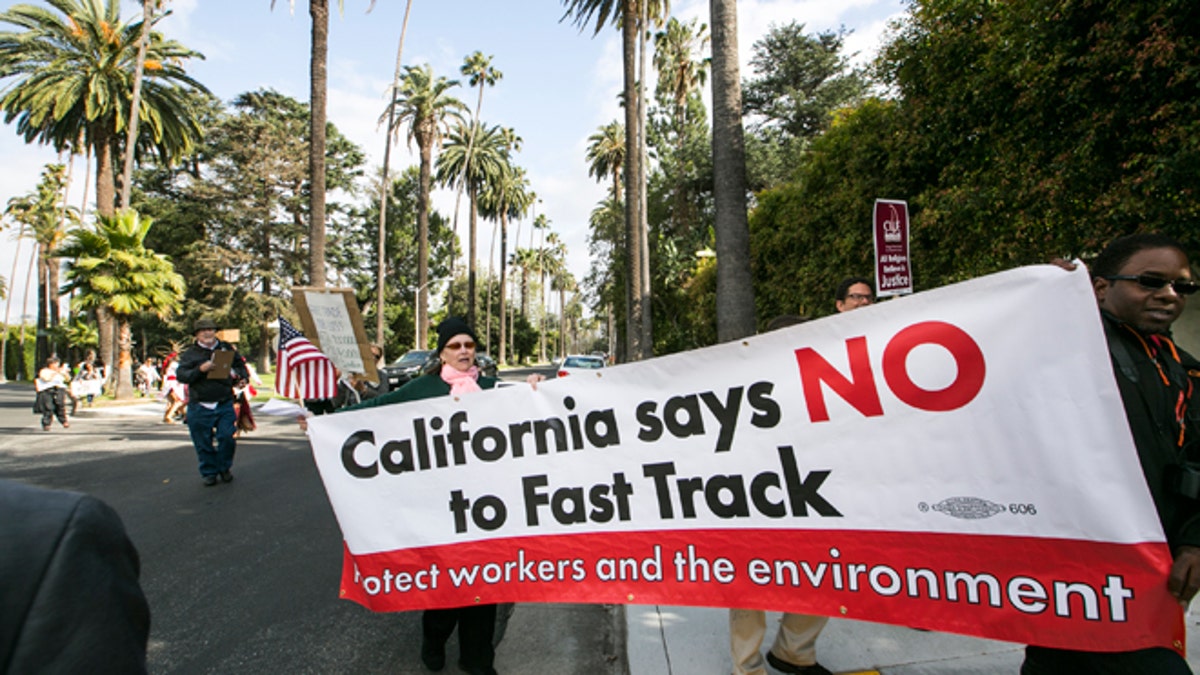
May 7, 2015: Los Angeles community members take to the streets of Beverly Hills to demand that Hillary Rodham Clinton oppose the Trans-Pacific Partnership (TPP) and Trade Promotion Authority (TPA) known as “The Fast Track,” in Beverly Hills, Calif. AP Photo/Damian Dovarganes
For decades free trade has been championed by most presidents regardless of party. It’s been an issue where Republicans and Democrats find common ground and work together to make American goods and services available to consumers outside the U.S. However, trade has now fallen prey to the political rancor in Congress, and concerns around trade are being voiced by both union-financed liberals and conservatives.
While a healthy debate on policy is needed and good for our democracy, the claims both are making as the Senate takes up Trade Promotion Authority (TPA) are just flat wrong.
A few conservatives on Capitol Hill believe a vote for TPA is a vote to increase the president’s power and authority. In fact, the opposite is true. With or without TPA, the president has the authority to negotiate on behalf of the U.S.
When you cut to the chase, conservatives and liberals should stop demonizing trade with unsubstantiated arguments and embrace the long-standing bipartisanship that surrounds the subject.
TPA simply expedites free trade agreements through Congress and ensures Congress has sufficient input. It also gives credibility to US negotiators sitting across the table from potential trade partners. It gives all negotiators the confidence that deals being worked out are with the knowledge and input of Congress and will not be loaded up on the back end by special interest seeking exemptions and carve outs. Furthermore, it gives Congress the ability to negotiate and draft the legislation that is needed to implement the trade agreement once the deal is done.
On the other side of the aisle, concerns about the economic impact of TPA are misplaced.
Unions have long opposed trade deals that support millions of union jobs. Their attempt to defeat TPA will hamper the already struggling economy by not opening new markets in which American companies could sell goods and services.
Opening new markets to American companies will create more jobs and economic opportunities for all American citizens. That includes small businesses, farmers, and ranchers, as well as American workers and consumers.
Trade increases what we can buy with a dollar and in turn increases our ability to provide for our families. At the same time, jobs of exporters pay on average $1,300 more.
The economic benefits don’t stop there. With the 20 trade agreements in place, one in five jobs, or nearly 40 million, is supported by trade and one in three acres of crops are exported. This will only increase as TPA will make way for new agreements, such as the Trans Pacific Pact (TPP). If passed and implemented, TPP, which includes 11 other countries, will open US producers to markets totaling 40 percent of the world economy.
Beef, for example, currently faces tariffs of 50 percent in that market, which includes our largest beef importer, Japan. Once the agreement is in place and those tariffs fall, beef exports by the US will surely increase.
Liberals often like to talk about equality and leveling the playing field. Well, let’s not forget that trade agreements do just that. Right now nearly 70 percent of U.S. imports are duty free. Negotiating and implementing agreements that lower the trade barriers for US exports will level the playing field and create equal opportunities for U.S. companies. That will result in economic growth, more jobs, and a positive economic impact for all U.S. citizens.
When you cut to the chase, conservatives and liberals should stop demonizing trade with unsubstantiated arguments and embrace the long-standing bipartisanship that surrounds the topic.
It’s time for the U.S. to regain its seat at the negotiating table with TPA and finalizes the pending trade deals.
Gretchen Hamel served as Deputy Assistant U.S. Trade Representative for Public and Media Affairs from 2006 to 2009.
